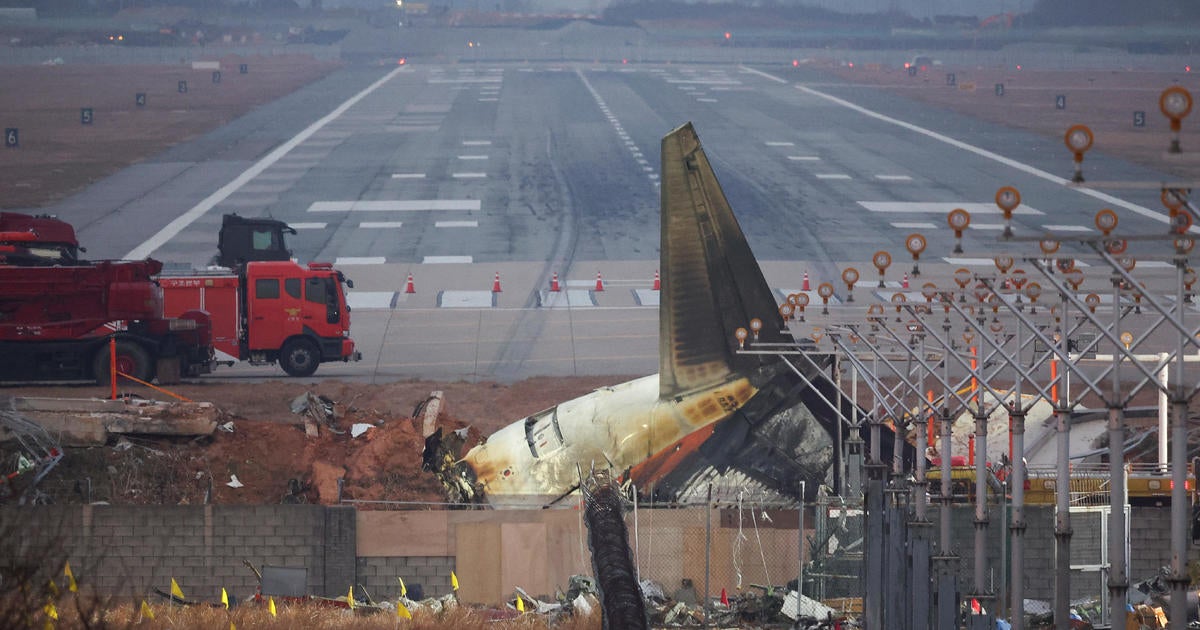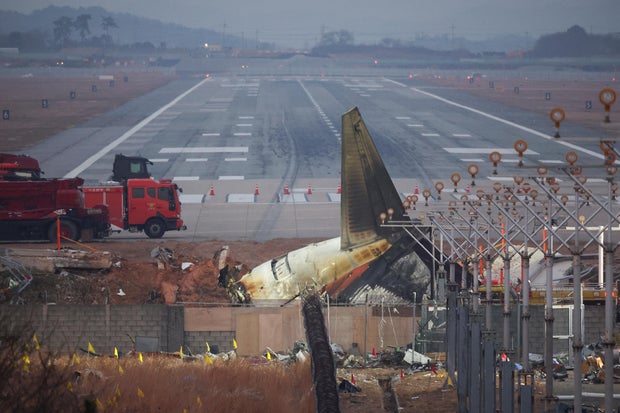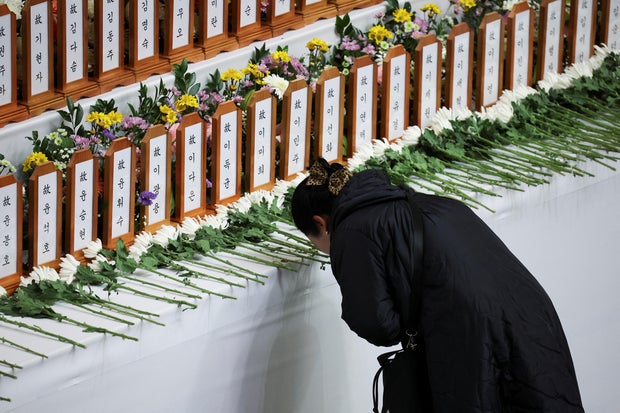The flight was carrying 181 passengers and crew from Thailand to South Korea on Sunday when it issued a mayday call and belly-landed before slamming into a barrier, killing all aboard except two flight attendants.
Authorities on Thursday carried out search and seizure operations at Muan airport where flight 2216 crashed, a regional aviation office in the southwestern city, and Jeju Air’s office in the capital Seoul, police said.
Jeju Air’s chief executive Kim E-bae has also been banned from leaving the country as the investigation continues, police said separately.
“The police plan to swiftly and rigorously determine the cause and responsibility for this accident in accordance with the law and principles,” police said in a statement sent to AFP.
At Muan airport Thursday, soldiers, police and white-suited investigators were still combing the crash site, as orange-robed monks held prayer ceremonies nearby.
Inside the airport, the stairs were covered in colourful post-it notes left by mourners.
“Honey, I miss you way too much,” one of them said.
“Even if you faced lonely and painful moments in death, may you now soar like a butterfly,” another read.
Kim Hong-Ji / REUTERS
Relatives also left flowers and food near the crash site including tteokguk — rice cake soup traditionally enjoyed in South Korea on New Year’s Day — as they said their goodbyes, many in tears.
Star chefs featured in Netflix’s megahit cooking competition show “Culinary Class Wars”, including Ahn Yu-seong, joined volunteers in Muan this week to prepare meals for the victims’ families.
And people nationwide were remotely pre-paying for coffee at the airport’s cafe so that victims’ families, who have been camped out in the lounge since Sunday, waiting for news, could drink for free.
More bodies were released Thursday to families to prepare for funerals, the land ministry said.
Officials initially pointed to a bird strike as a possible cause of the crash, and have since said the probe was also examining the role of a concrete barrier at the end of the runway.
Dramatic video showed the plane colliding with it before bursting into flames.
Yonhap reported the Muan airport warrant was approved on charges of professional negligence resulting in death, citing officials.
“Police are securing evidence related to the legitimacy of the airport’s localizer,” Yonhap said, referring to the concrete wall at the end of the runway housing an antenna array.
They are also seeking communication records between the control tower and the pilot shortly before the plane crash, it added.
Airports nationwide were being inspected to check other similar localizers, the land ministry said in a statement.
Some experts have suggested that the disaster may have been less deadly if the installation not been concrete.
“Key to unlocking this mystery”
South Korea has also announced it will inspect all Boeing 737-800 aircraft operated by its carriers, focusing on the landing gear, which appears to have malfunctioned during the Sunday crash.
South Korea’s acting president, Choi Sang-mok, said Thursday that “immediate action” must be taken if that probe uncovered any issues with the aircraft model.
Authorities have previously said 101 aircraft of the same model were in operation by six different airlines.
“As there’s great public concern about the same aircraft model involved in the accident, the transport ministry and relevant agencies must conduct a thorough inspection of operation maintenance, education, and training,” Choi said Thursday.
The accident is the worst aviation disaster on South Korean soil.
Kim Hong-Ji / REUTERS
South Korean authorities have completed the initial extraction of data for the cockpit voice recorder, but the flight data recorder was damaged and was to be sent to the United States for analysis, officials said Wednesday.
Investigators say it was not feasible to locally decode the damaged flight data recorder, which is missing a crucial connector, BBC News reported.
“I think the cockpit voice recorder, if they’re able to read that out, that will be key to unlocking this mystery,” Robert Sumwalt, former chair of the NTSB, told CBS News.
Jeju Air said the crash was not due to “any maintenance issues,” according to South Korea’s Yonhap news agency, and aviation expert Geoffrey Thomas told BBC News that South Korea’s airlines were broadly deemed to follow “industry best practice” and that both the plane and Jeju Air had an “excellent safety record.”
Plane Crash, South Korea
#Police #raid #Jeju #Air #offices #crash #killed #people #South #Korea #airline #CEO #banned #leaving #country





